1
The really important kind of freedom involves attention, and awareness, and discipline, and effort, and being able truly to care about other people and to sacrifice for them, over and over, in myriad petty little unsexy ways, every day.David Foster Wallace
2
To me, at least in retrospect, the really interesting question is why dullness proves to be such a powerful impediment to attention. Why we recoil from the dull. Maybe it’s because dullness is intrinsically painful; maybe that’s where phrases like ‘deadly dull’ or ‘excruciatingly dull’ come from. But there might be more to it. Maybe dullness is associated with psychic pain because something that’s dull or opaque fails to provide enough stimulation to distract people from some other, deeper type of pain that is always there, if only in an ambient, low-level way, and which most of us spend nearly all our time and energy trying to distract ourselves from feeling, or at least from feeling directly or with our full attention. Admittedly, the whole thing’s pretty confusing, and hard to talk about abstractly…but surely something must lie behind not just Muzak in dull or tedious places any more but now also actual TV in waiting rooms, supermarkets’ checkouts, airport gates, SUVs’ backseats. Walkman, i Pods, BlackBerries, cell phones that attach to your head. This terror of silence with nothing diverting to do. I can’t think anyone really believes that today’s so-called ‘information society’ is just about information. Everyone knows it’s about something else, way down. .David Foster Wallace
3
Because here's something else that's weird but true: in the day-to-day trenches of adult life, there is actually no such thing as atheism. There is no such thing as not worshipping. Everybody worships. The only choice we get is what to worship. And the compelling reason for maybe choosing some sort of god or spiritual-type thing to worship--be it JC or Allah, be it YHWH or the Wiccan Mother Goddess, or the Four Noble Truths, or some inviolable set of ethical principles--is that pretty much anything else you worship will eat you alive. If you worship money and things, if they are where you tap real meaning in life, then you will never have enough, never feel you have enough. It's the truth. Worship your body and beauty and sexual allure and you will always feel ugly. And when time and age start showing, you will die a million deaths before they finally grieve you. On one level, we all know this stuff already. It's been codified as myths, proverbs, clichés, epigrams, parables; the skeleton of every great story. The whole trick is keeping the truth up front in daily consciousness. Worship power, you will end up feeling weak and afraid, and you will need ever more power over others to numb you to your own fear. Worship your intellect, being seen as smart, you will end up feeling stupid, a fraud, always on the verge of being found out. But the insidious thing about these forms of worship is not that they're evil or sinful, it's that they're unconscious. They are default settings. They're the kind of worship you just gradually slip into, day after day, getting more and more selective about what you see and how you measure value without ever being fully aware that that's what you're doing.David Foster Wallace
4
Mario, what do you get when you cross an insomniac, an unwilling agnostic and a dyslexic?"" I give."" You get someone who stays up all night torturing himself mentally over the question of whether or not there's a dog.David Foster Wallace
5
There are these two young fish swimming along and they happen to meet an older fish swimming the other way, who nods at them and says "Morning, boys. How's the water?" And the two young fish swim on for a bit, and then eventually one of them looks over at the other and goes "What the hell is water?David Foster Wallace
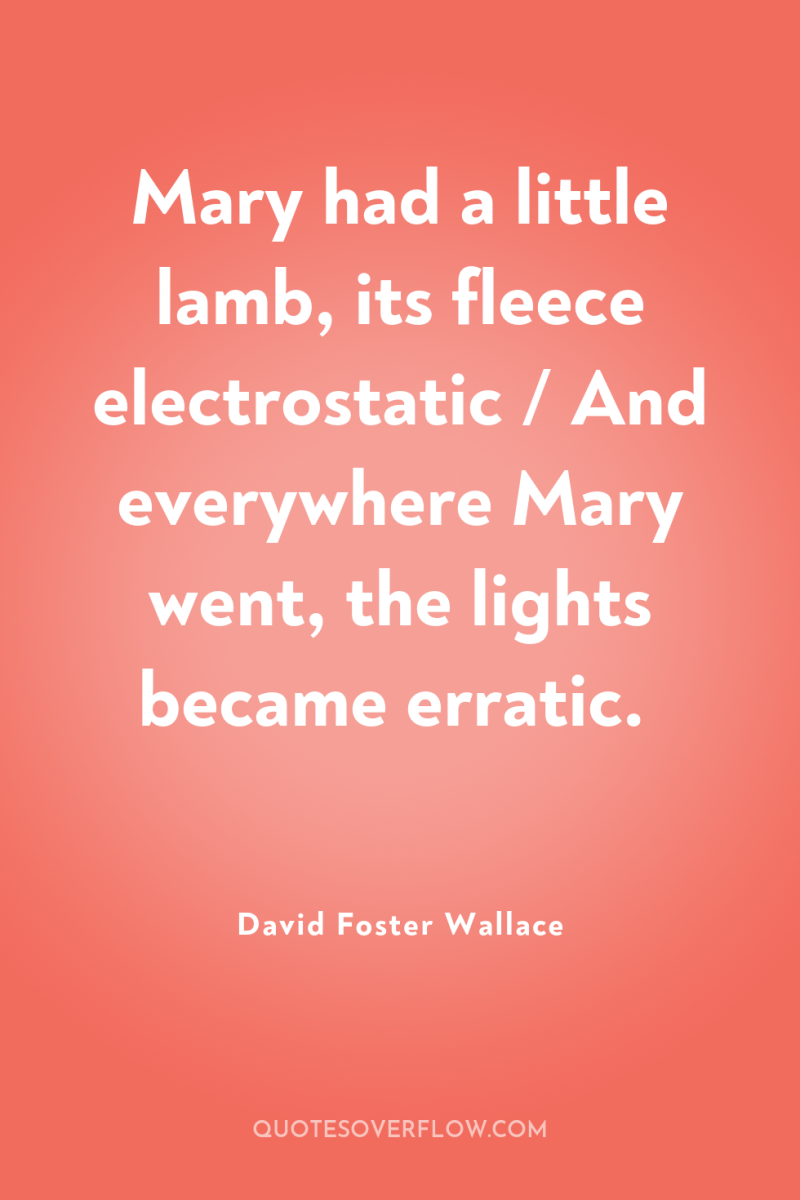
6
Mary had a little lamb, its fleece electrostatic / And everywhere Mary went, the lights became erratic.David Foster Wallace
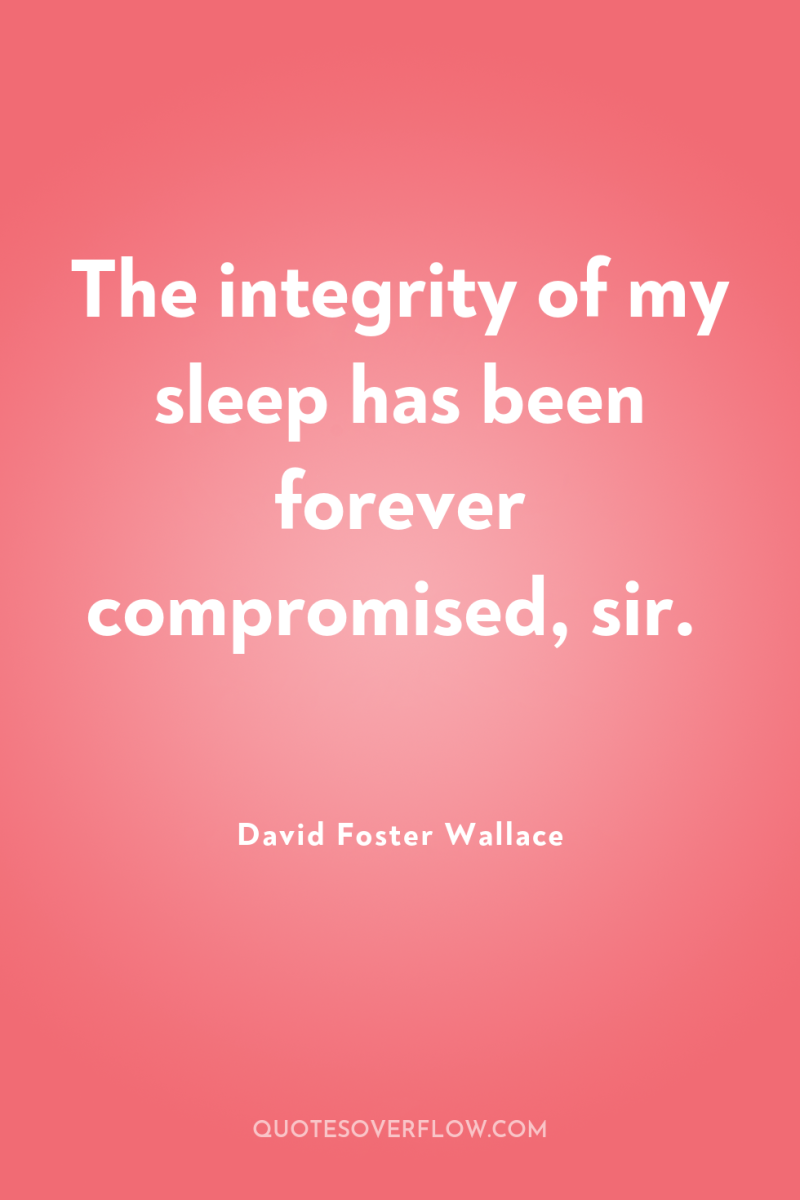
7
The integrity of my sleep has been forever compromised, sir.David Foster Wallace
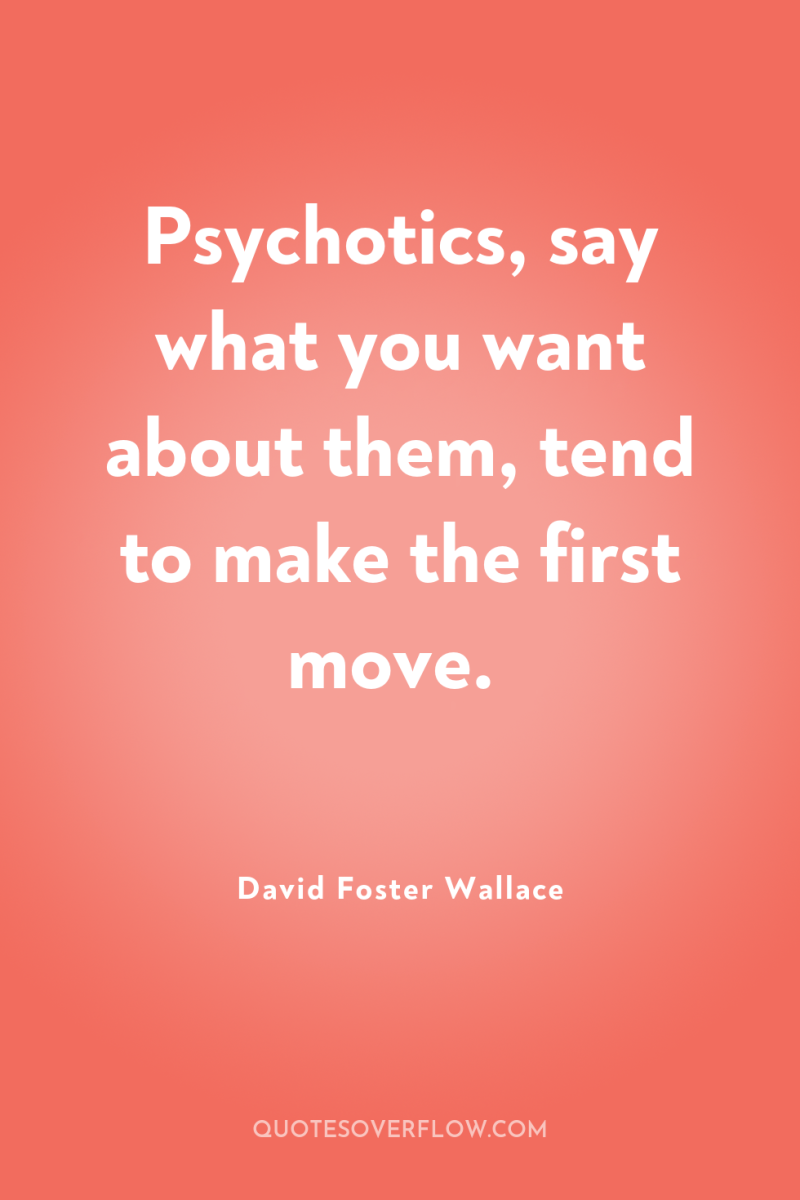
8
Psychotics, say what you want about them, tend to make the first move.David Foster Wallace
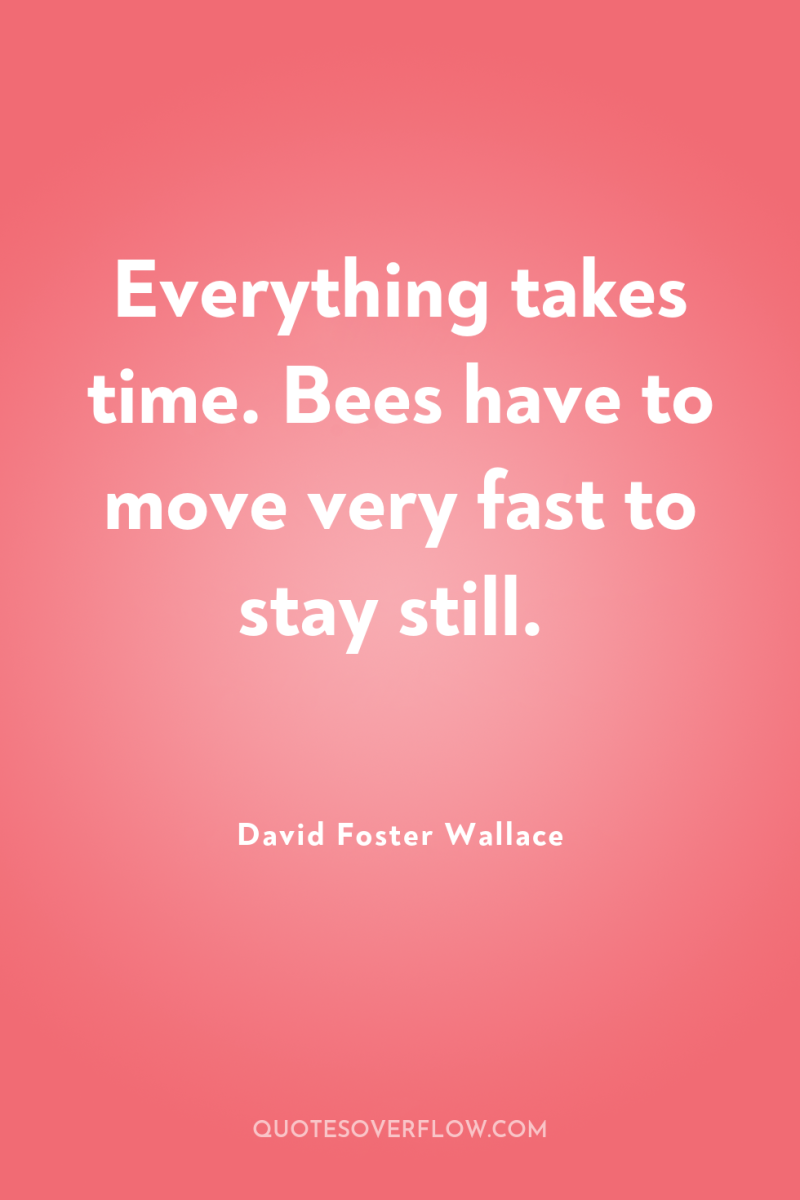
9
Everything takes time. Bees have to move very fast to stay still.David Foster Wallace
10
It's always seemed a little preposterous that Hamlet, for all his paralyzing doubt about everything, never once doubts the reality of the ghost. Never questions his own madness might not in fact be unfeigned.David Foster Wallace
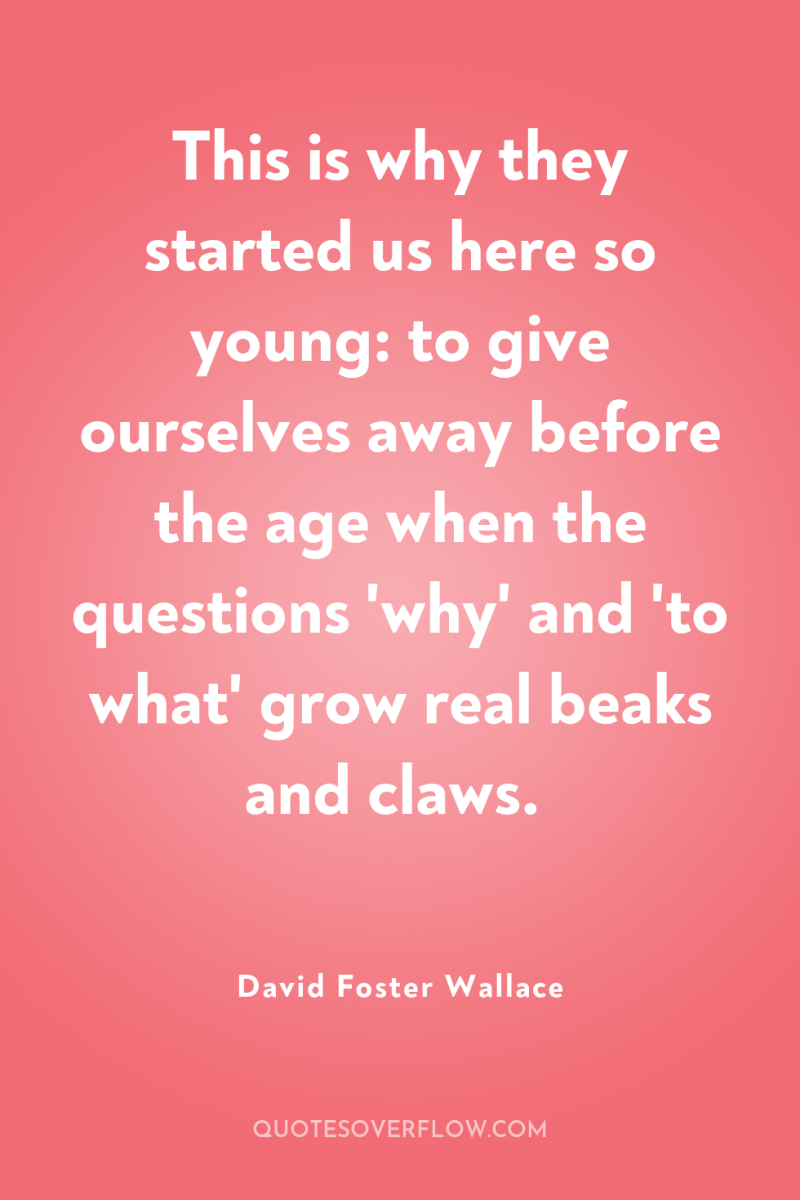
11
This is why they started us here so young: to give ourselves away before the age when the questions 'why' and 'to what' grow real beaks and claws.David Foster Wallace
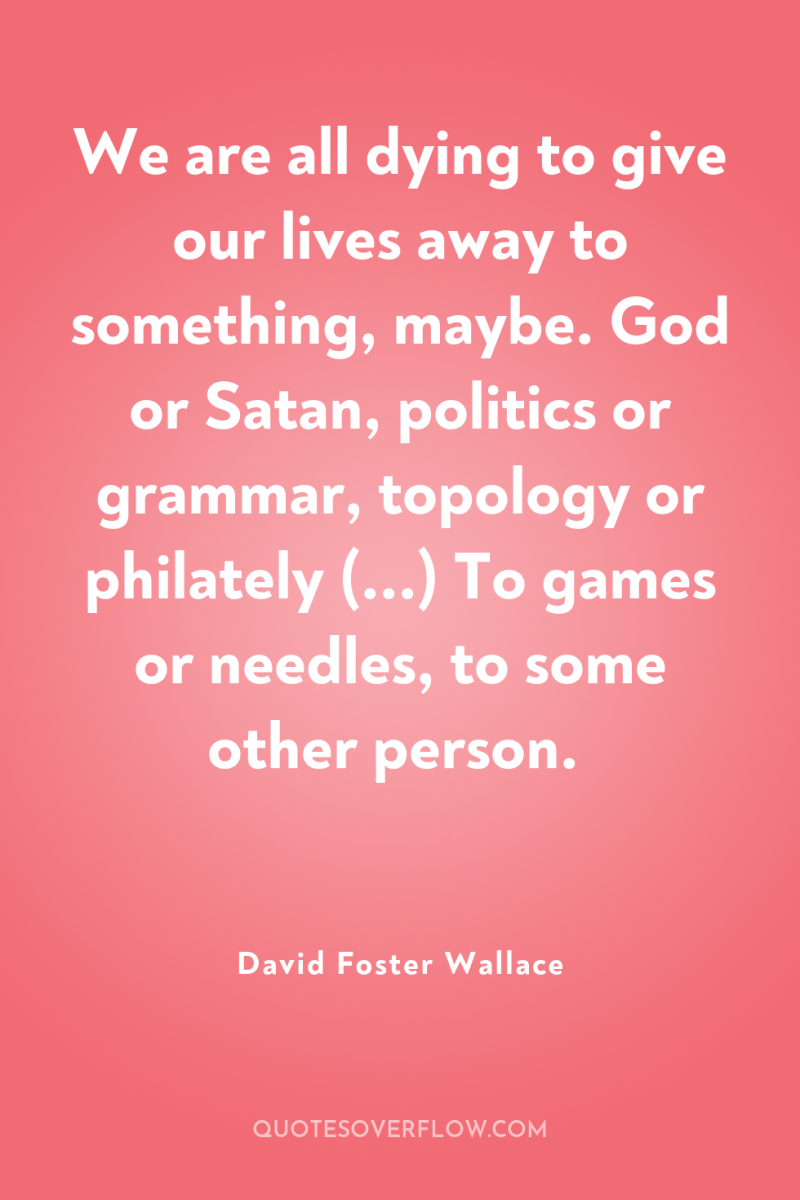
12
We are all dying to give our lives away to something, maybe. God or Satan, politics or grammar, topology or philately (...) To games or needles, to some other person.David Foster Wallace
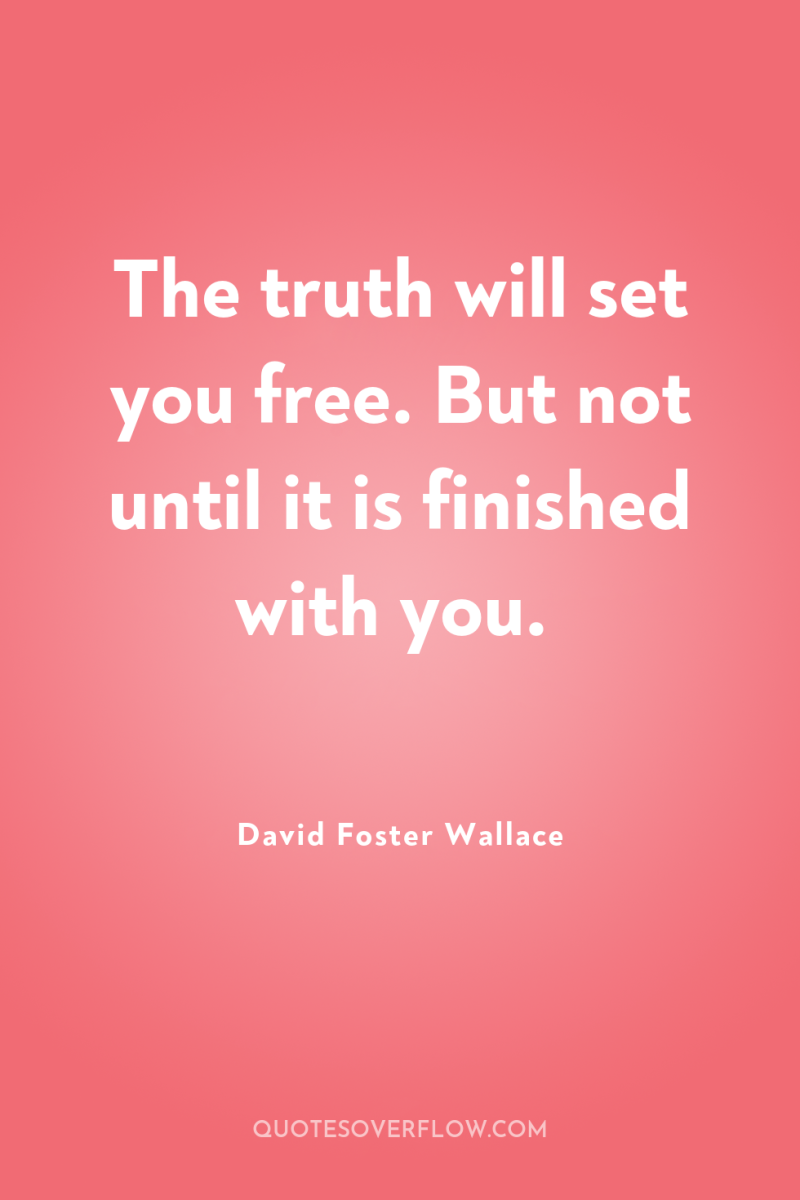
13
The truth will set you free. But not until it is finished with you.David Foster Wallace
14
That sometimes human beings have to just sit in one place and, like, hurt. That you will become way less concerned with what other people think of you when you realize how seldom they do. That there is such a thing as raw, unalloyed, agendaless kindness. That it is possible to fall asleep during an anxiety attack. That concentrating on anything is very hard work.David Foster Wallace
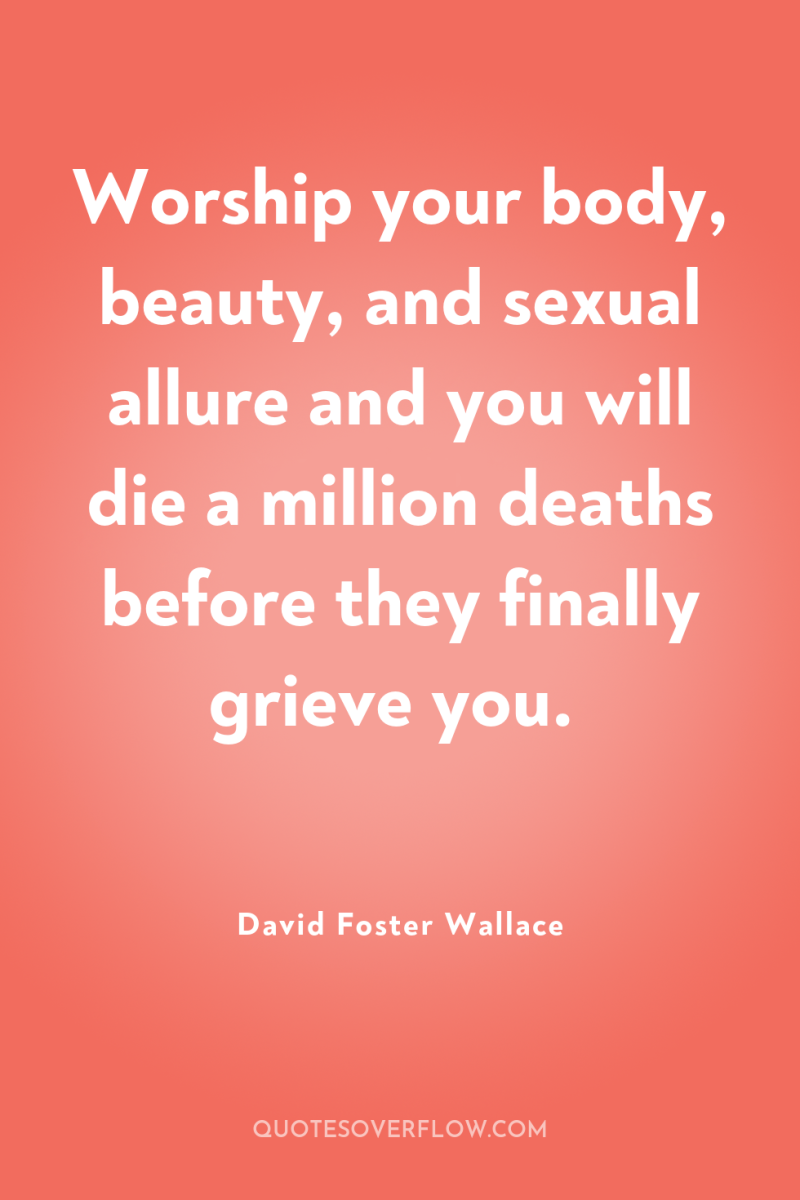
15
Worship your body, beauty, and sexual allure and you will die a million deaths before they finally grieve you.David Foster Wallace
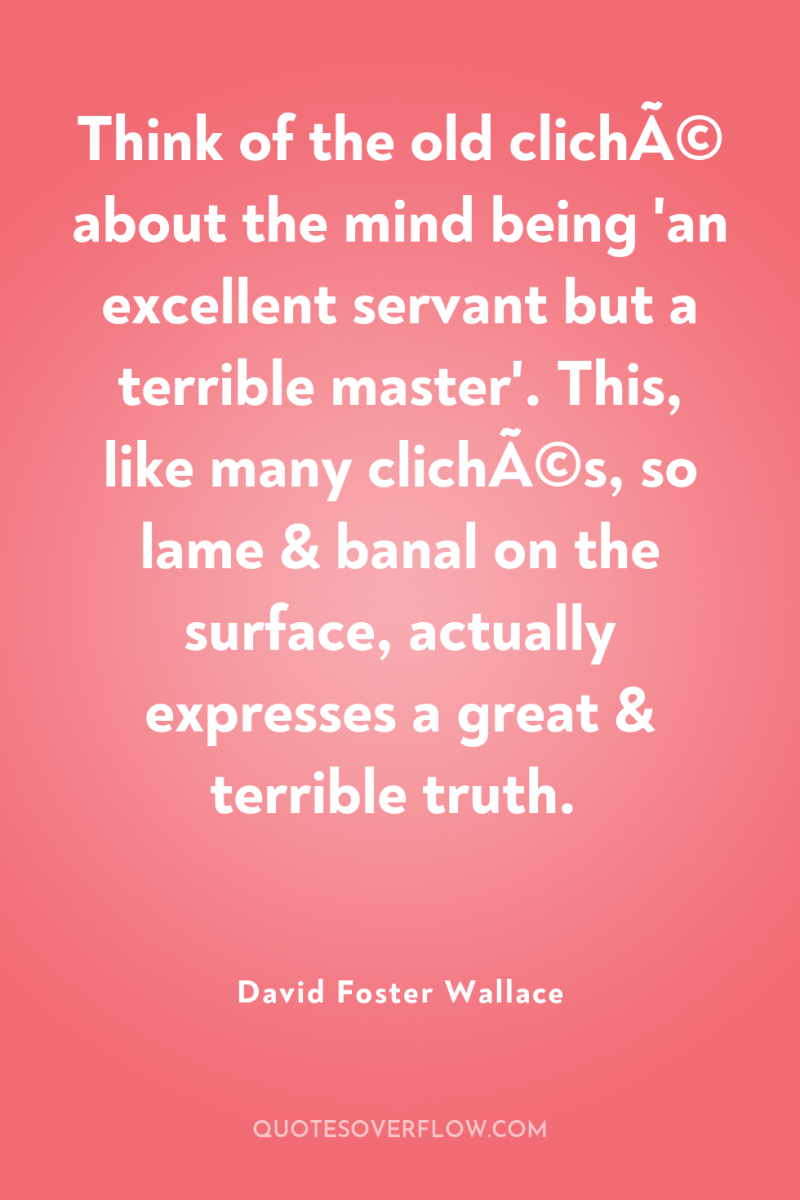
16
Think of the old cliché about the mind being 'an excellent servant but a terrible master'. This, like many clichés, so lame & banal on the surface, actually expresses a great & terrible truth.David Foster Wallace
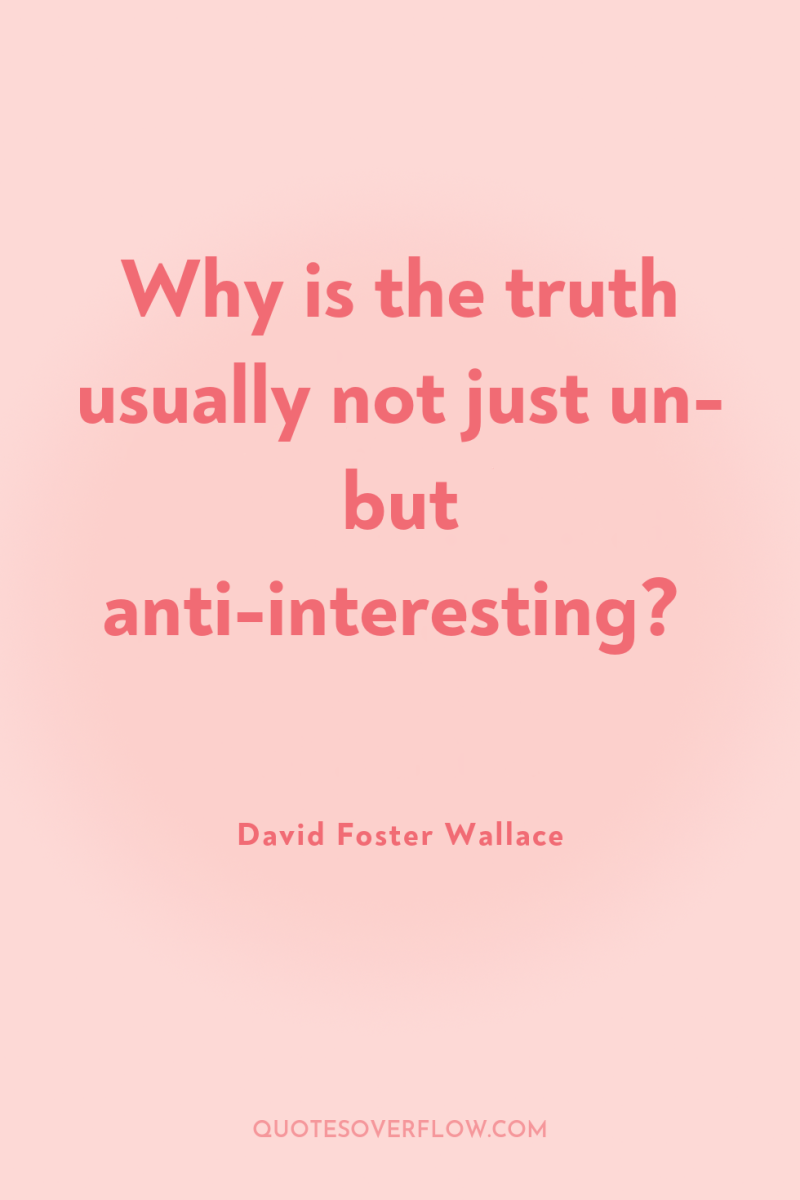
17
Why is the truth usually not just un- but anti-interesting?David Foster Wallace
18
Because here's something else that's weird but true: in the day-to day trenches of adult life, there is actually no such thing as atheism. There is no such thing as not worshipping. Everybody worships. The only choice we get is what to worship. And the compelling reason for maybe choosing some sort of god or spiritual-type thing to worship–be it JC or Allah, be it YHWH or the Wiccan Mother Goddess, or the Four Noble Truths, or some inviolable set of ethical principles–is that pretty much anything else you worship will eat you alive. If you worship money and things, if they are where you tap real meaning in life, then you will never have enough, never feel you have enough. It's the truth. Worship your body and beauty and sexual allure and you will always feel ugly. And when time and age start showing, you will die a million deaths before they finally grieve you. On one level, we all know this stuff already. It's been codified as myths, proverbs, clichés, epigrams, parables; the skeleton of every great story. The whole trick is keeping the truth up front in daily consciousness.David Foster Wallace
19
So tonight to shush you how about if I say I have administrative bones to pick with God, Boo. I'll say God seems to have a kind of laid-back management style I'm not crazy about. I'm pretty much anti-death. God looks by all accounts to be pro-death. I'm not seeing how we can get together on this issue, he and I, Boo.David Foster Wallace
20
I felt despair. The word’s overused and banalified now, despair, but it’s a serious word, and I’m using it seriously. For me it denotes a simple admixture – a weird yearning for death combined with a crushing sense of my own smallness and futility that presents as a fear of death. It’s maybe close to what people call dread or angst. But it’s not these things, quite. It’s more like wanting to die in order to escape the unbearable feeling of becoming aware that I’m small and weak and selfish and going without any doubt at all to die. It’s wanting to jump overboard. .David Foster Wallace
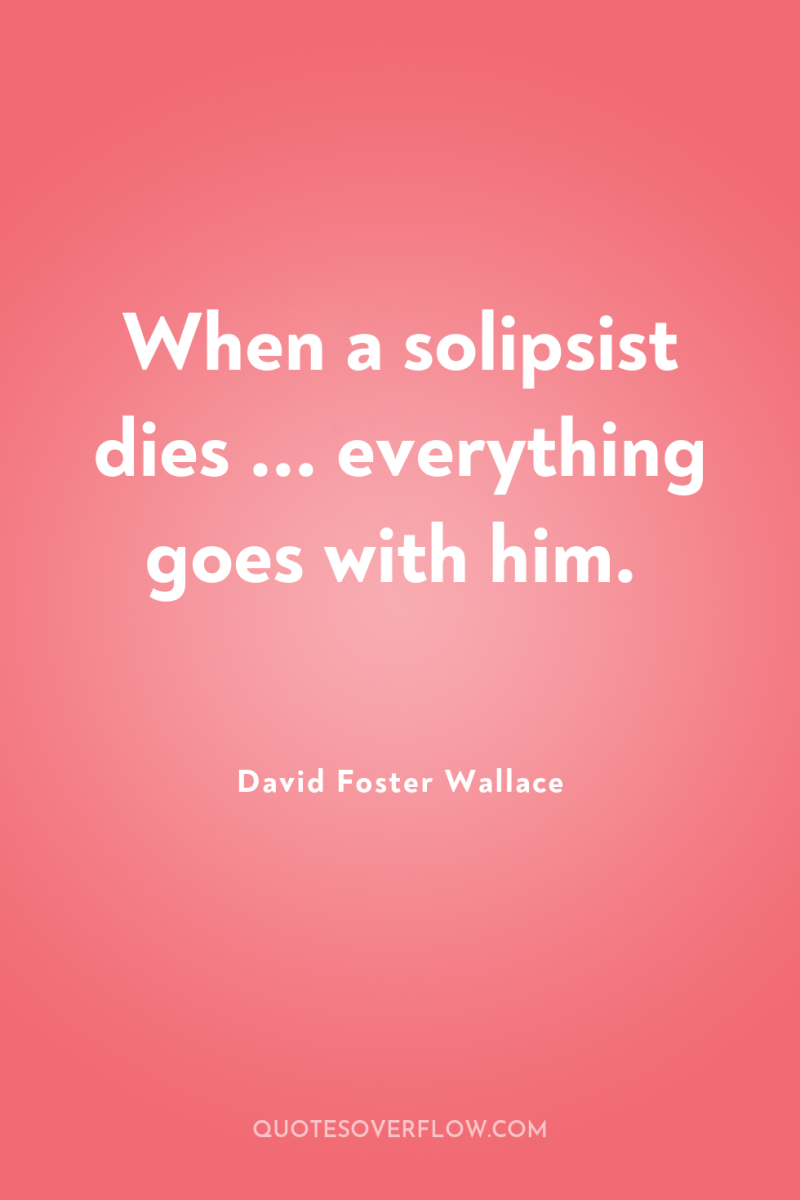
21
When a solipsist dies ... everything goes with him.David Foster Wallace

22
I'm so scared of dying without ever being really seen.David Foster Wallace
23
Literary fiction and poetry are real marginalized right now. There's a fallacy that some of my friends sometimes fall into, the ol' "The audience is stupid. The audience only wants to go this deep. Poor us, we're marginalized because of TV, the great hypnotic blah, blah." You can sit around and have these pity parties for yourself. Of course this is bullshit. If an art form is marginalized it's because it's not speaking to people. One possible reason is that the people it's speaking to have become too stupid to appreciate it. That seems a little easy to me.David Foster Wallace
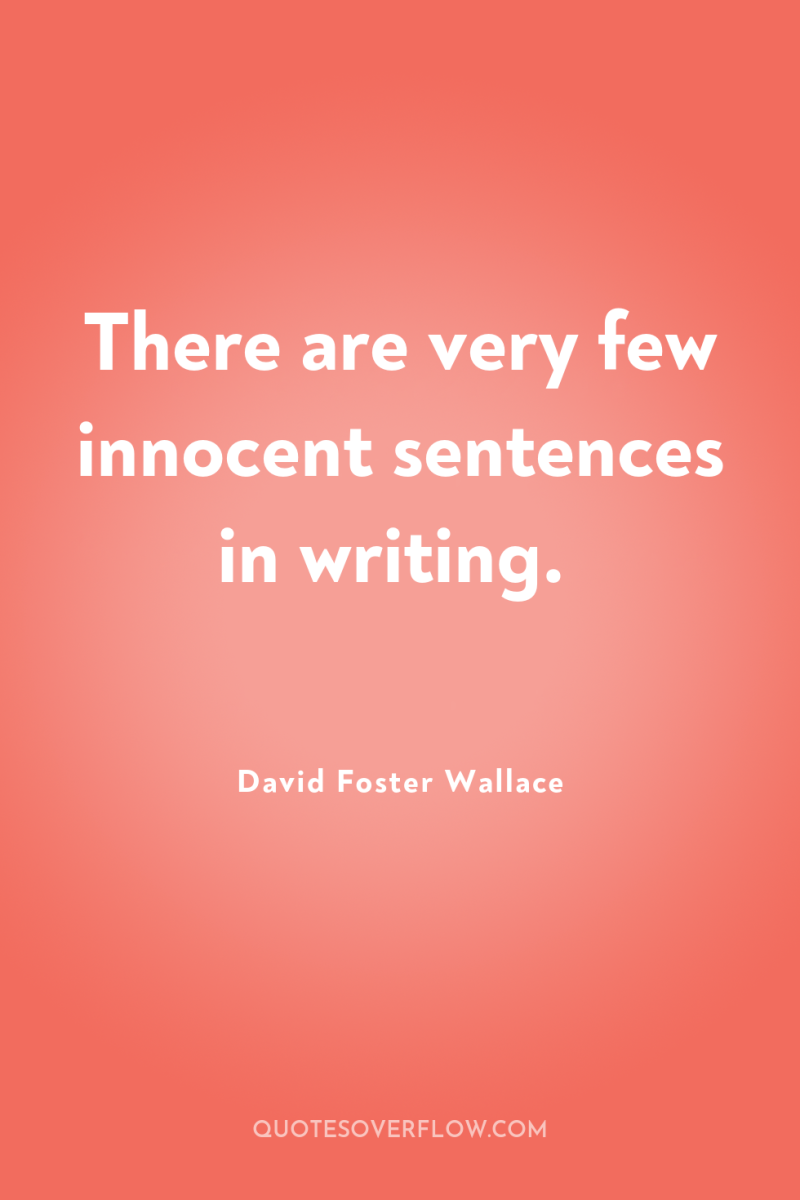
24
There are very few innocent sentences in writing.David Foster Wallace
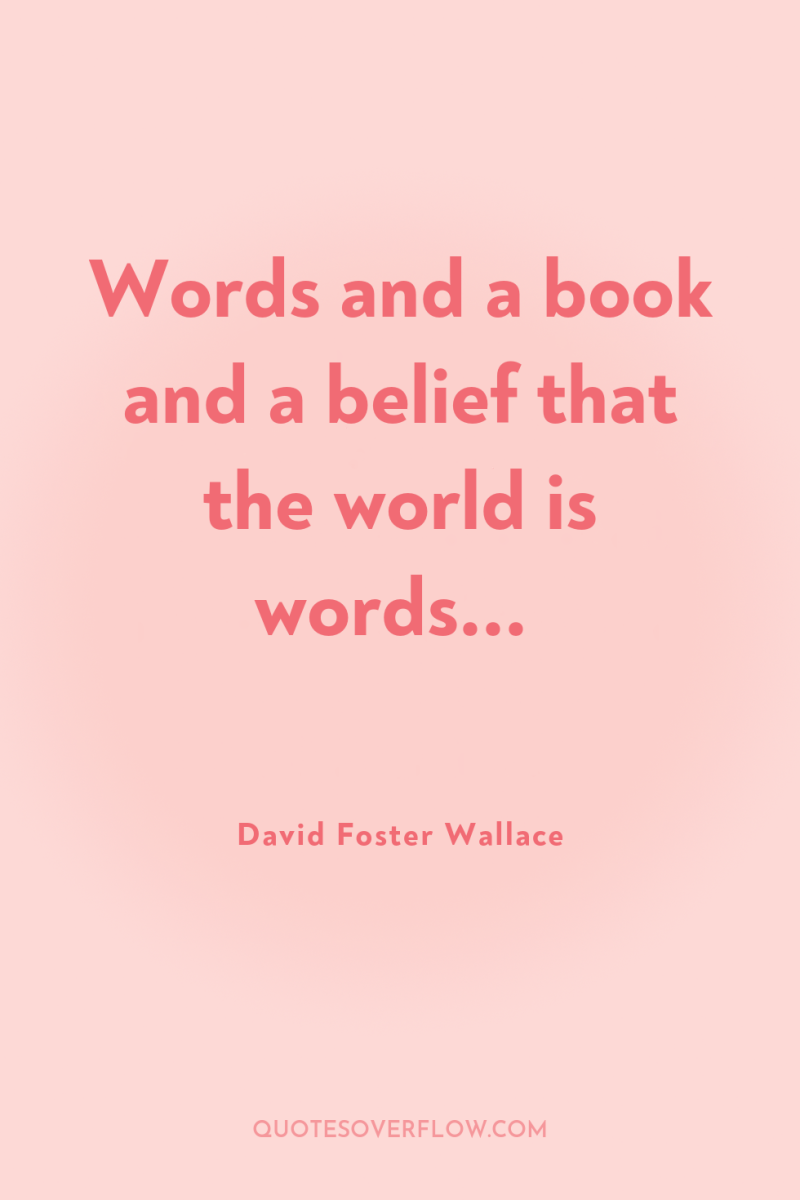
25
Words and a book and a belief that the world is words...David Foster Wallace
26
You have a great deal of yourself on the line, writing– your vanity is at stake. You discover a tricky thing about fiction writing; a certain amount of vanity is necessary to be able to do it all, but any vanity above that certain amount is lethal.David Foster Wallace
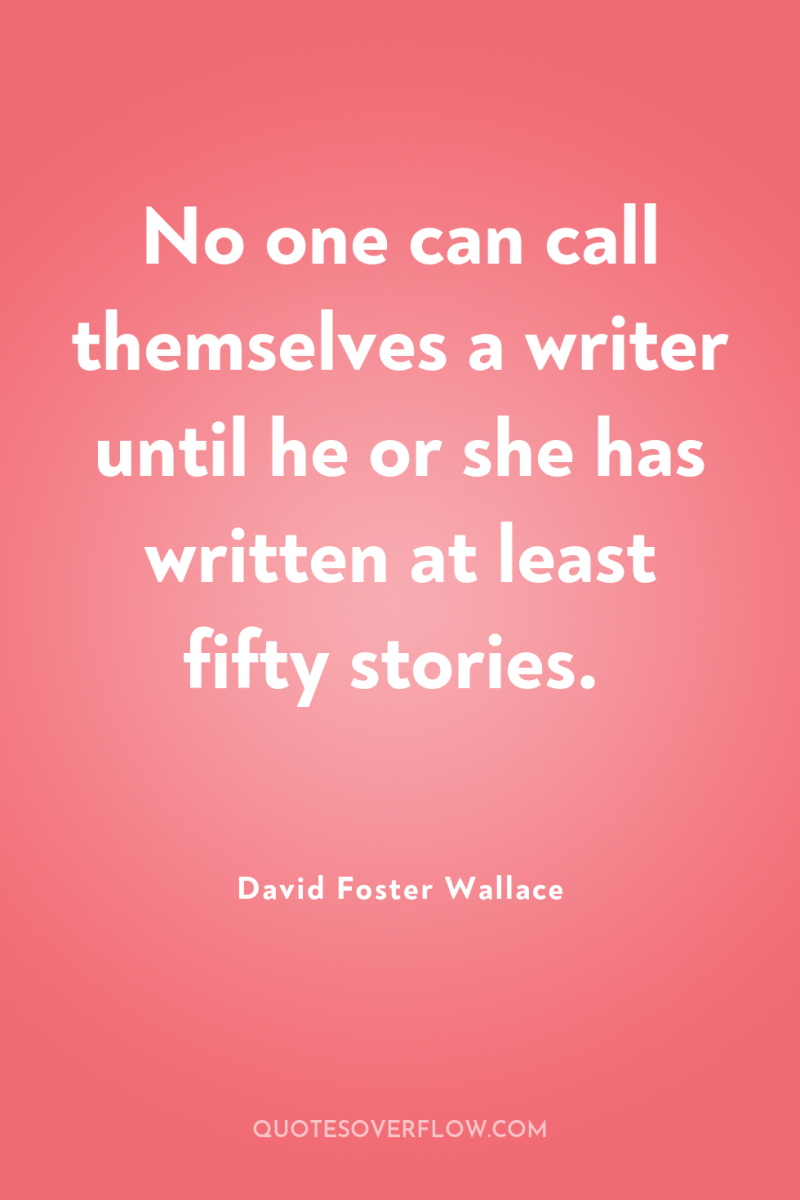
27
No one can call themselves a writer until he or she has written at least fifty stories.David Foster Wallace
28
The key is the ability, whether innate or conditioned, to find the other side of the rote, the picayune, the meaningless, the repetitive, the pointlessly complex. To be, in a word, unborable … If you are immune to boredom, there is literally nothing you cannot accomplish.David Foster Wallace
29
Fervent Christians are always remembering themselves as - and thus, by extension, judging everyone else outside their sect to be - lost and hopeless and just barely clinging to any kind of interior sense of value or reason or even to go on living, before they were 'saved.David Foster Wallace
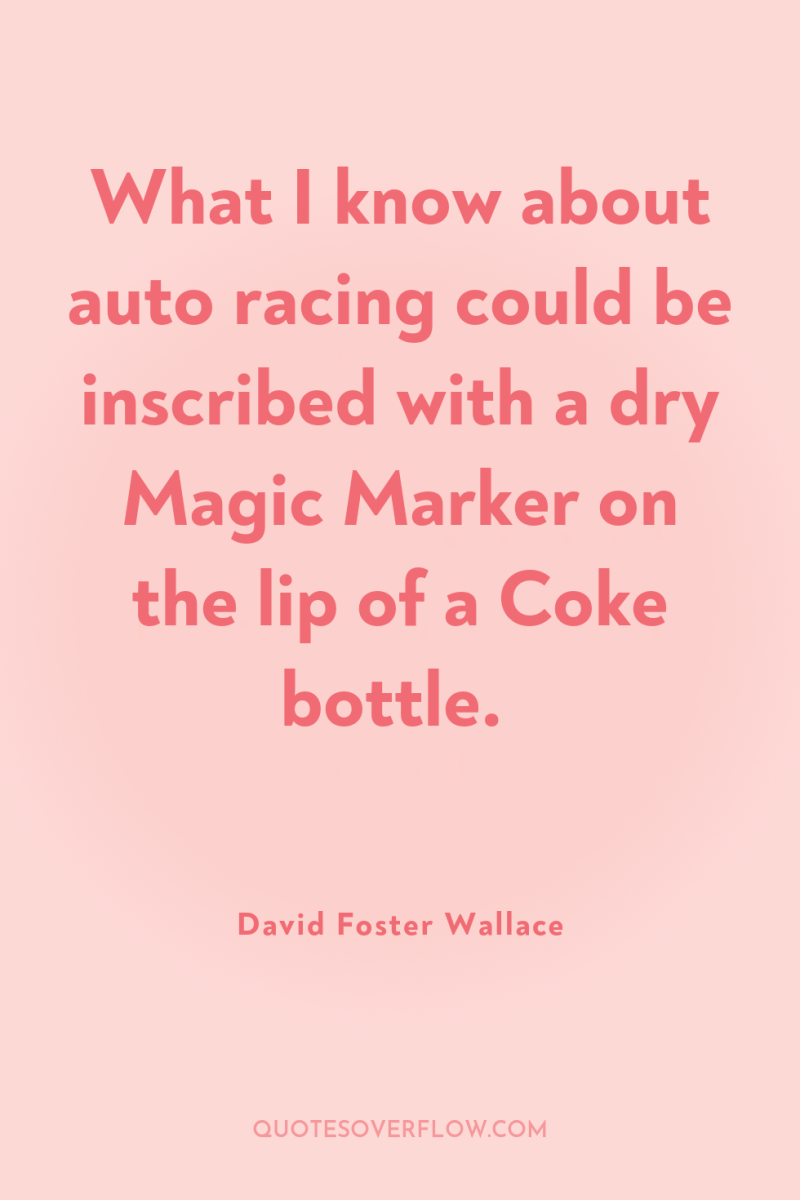
30
What I know about auto racing could be inscribed with a dry Magic Marker on the lip of a Coke bottle.David Foster Wallace
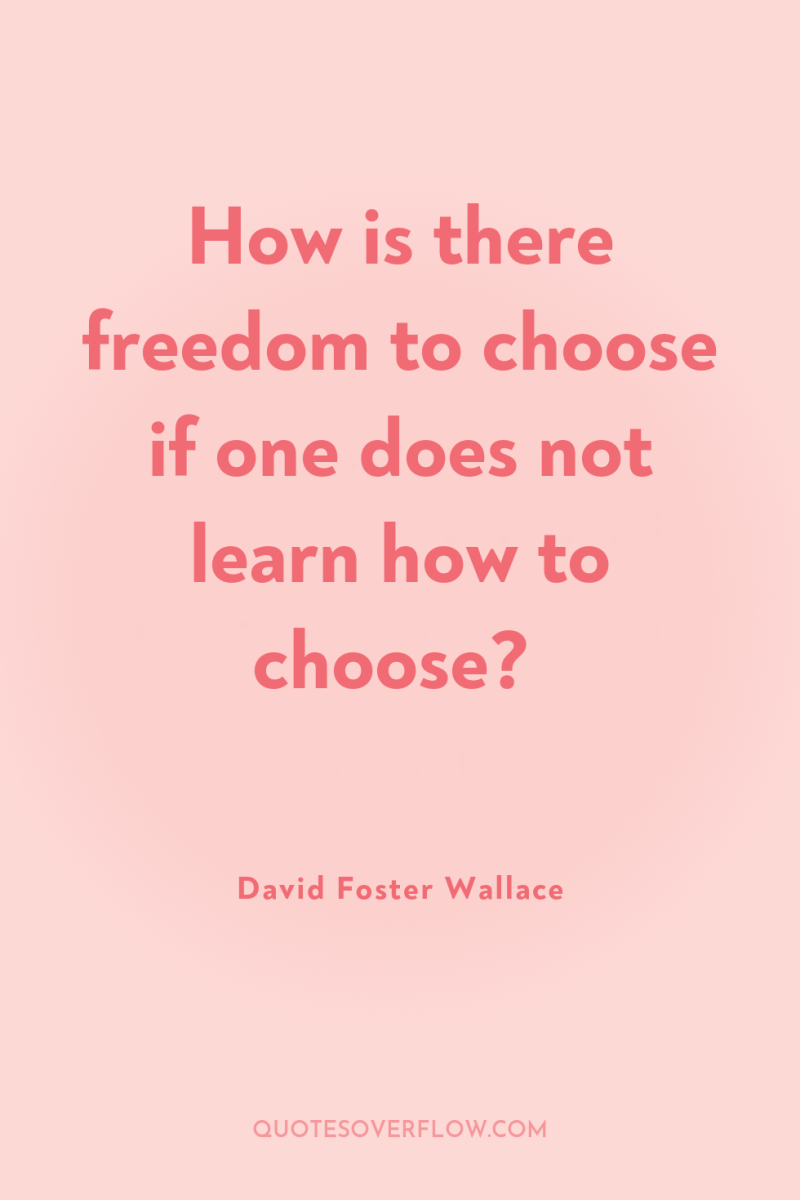
31
How is there freedom to choose if one does not learn how to choose?David Foster Wallace
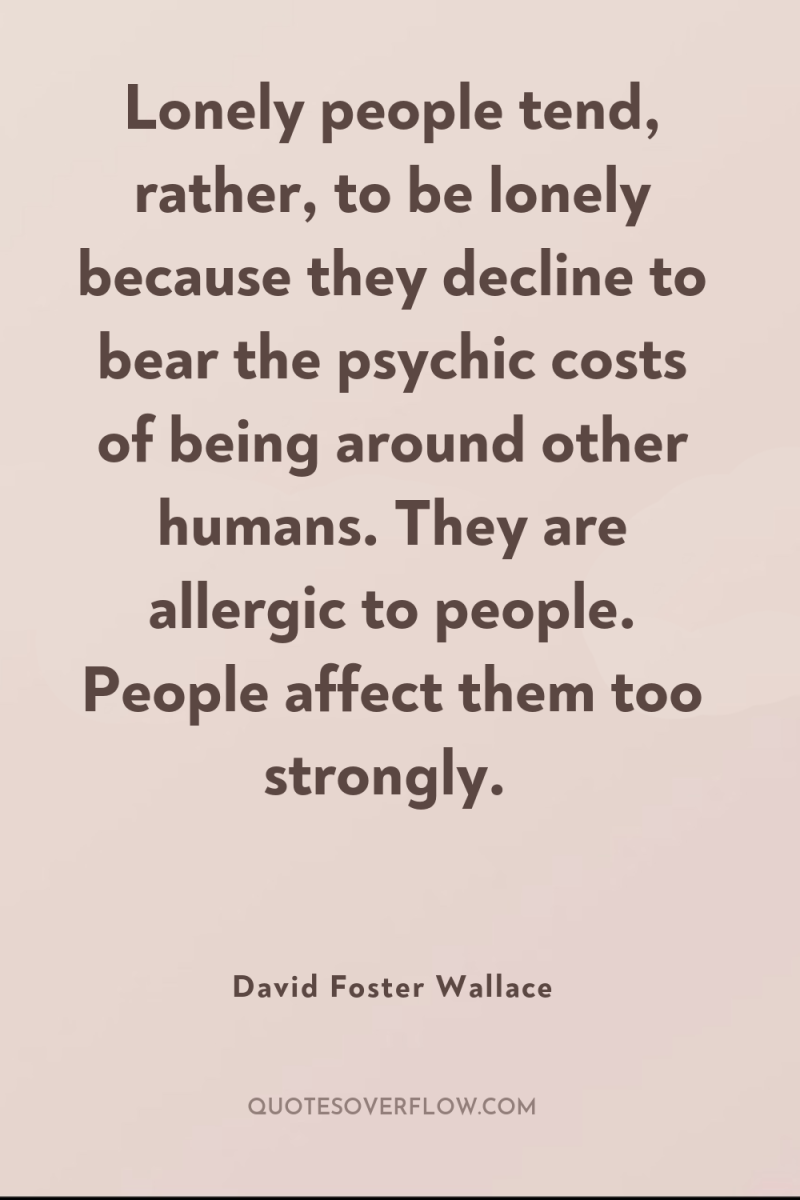
32
Lonely people tend, rather, to be lonely because they decline to bear the psychic costs of being around other humans. They are allergic to people. People affect them too strongly.David Foster Wallace
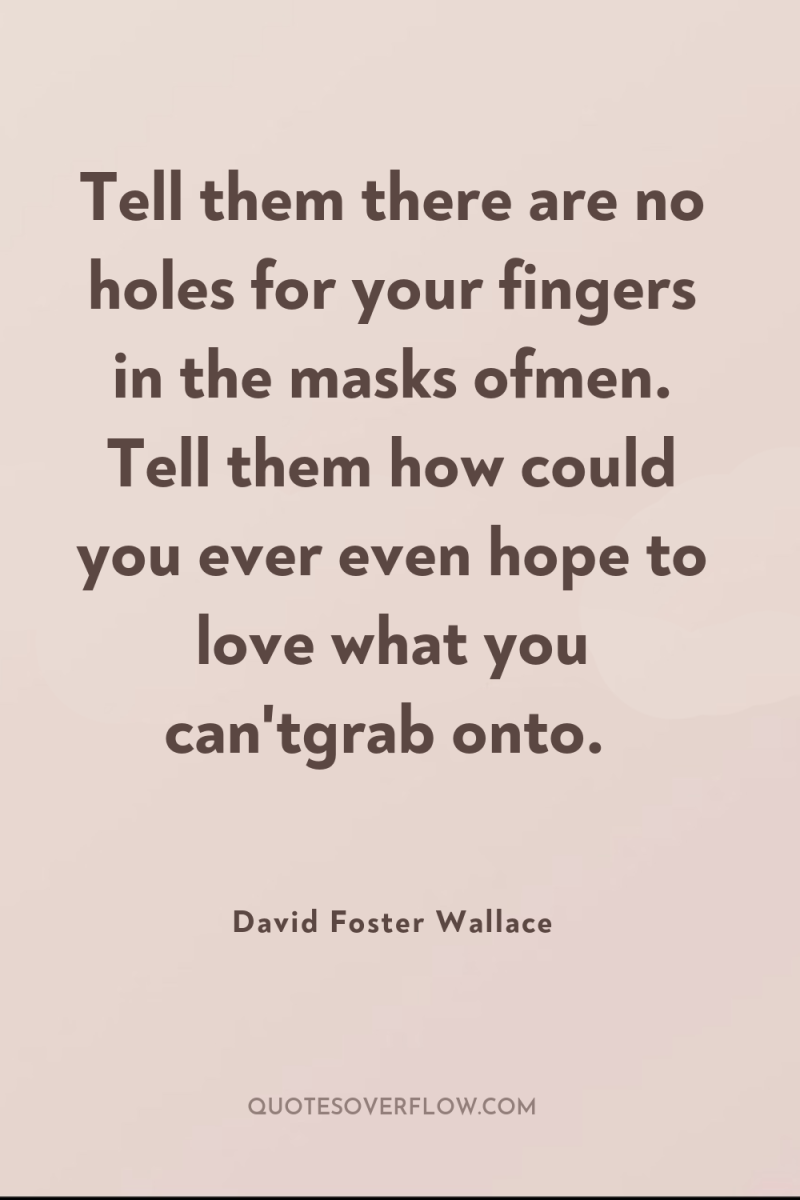
33
Tell them there are no holes for your fingers in the masks ofmen. Tell them how could you ever even hope to love what you can'tgrab onto.David Foster Wallace
34
I am now 33 years old, and it feels like much time has passed and is passing faster and faster every day. Day to day I have to make all sorts of choices about what is good and important and fun, and then I have to live with the forfeiture of all the other options those choices foreclose. And I'm starting to see how as time gains momentum my choices will narrow and their foreclosures multiply exponentially until I arrive at some point on some branch of all life's sumptuous branching complexity at which I am finally locked in and stuck on one path and time speeds me through stages of stasis and atrophy and decay until I go down for the third time, all struggle for naught, drowned by time. It is dreadful. But since it's my own choices that'll lock me in, it seems unavoidable--if I want to be any kind of grownup, I have to make choices and regret foreclosures and try to live with them.David Foster Wallace
35
There’s been time this whole time. You can’t kill time with your heart. Everything takes time.David Foster Wallace

36
Time wasn't passing so much as kneeling beside him in a torn tee-shirt disclosing the rodent-nosed tits of a man who disdains the care of his once-comely bod.David Foster Wallace
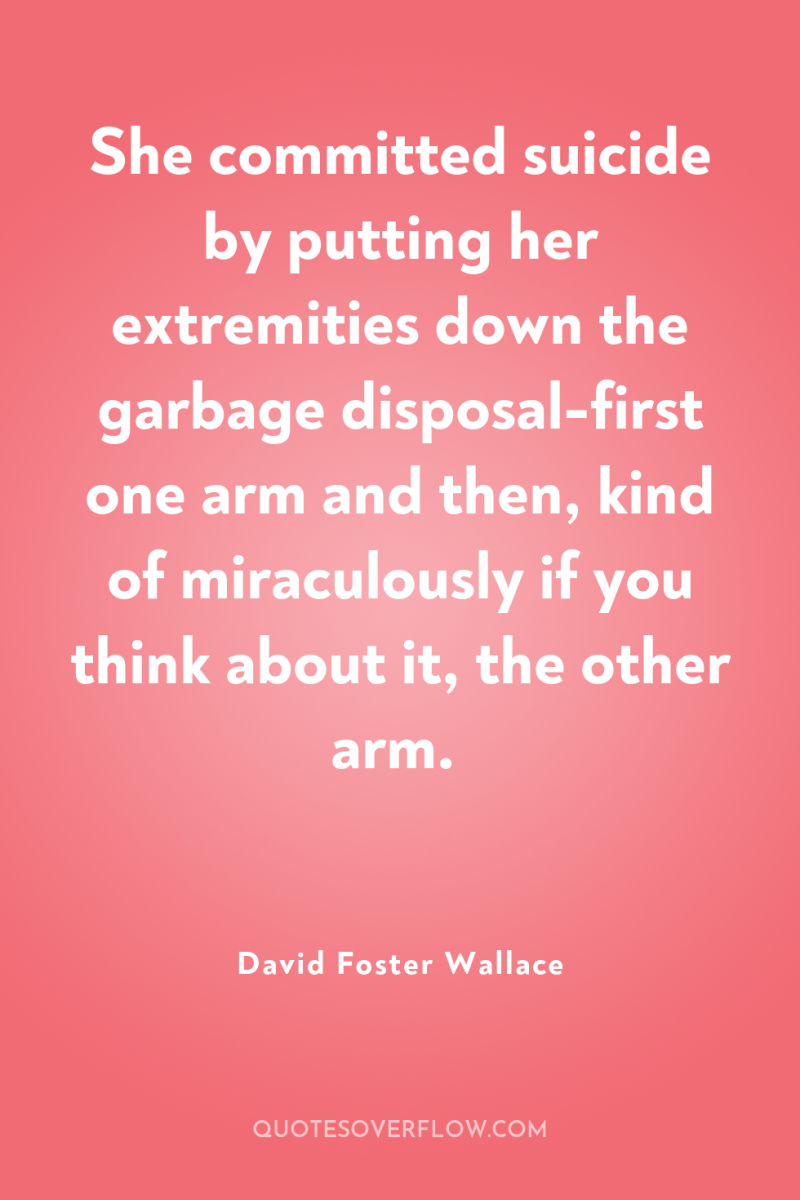
37
She committed suicide by putting her extremities down the garbage disposal-first one arm and then, kind of miraculously if you think about it, the other arm.David Foster Wallace
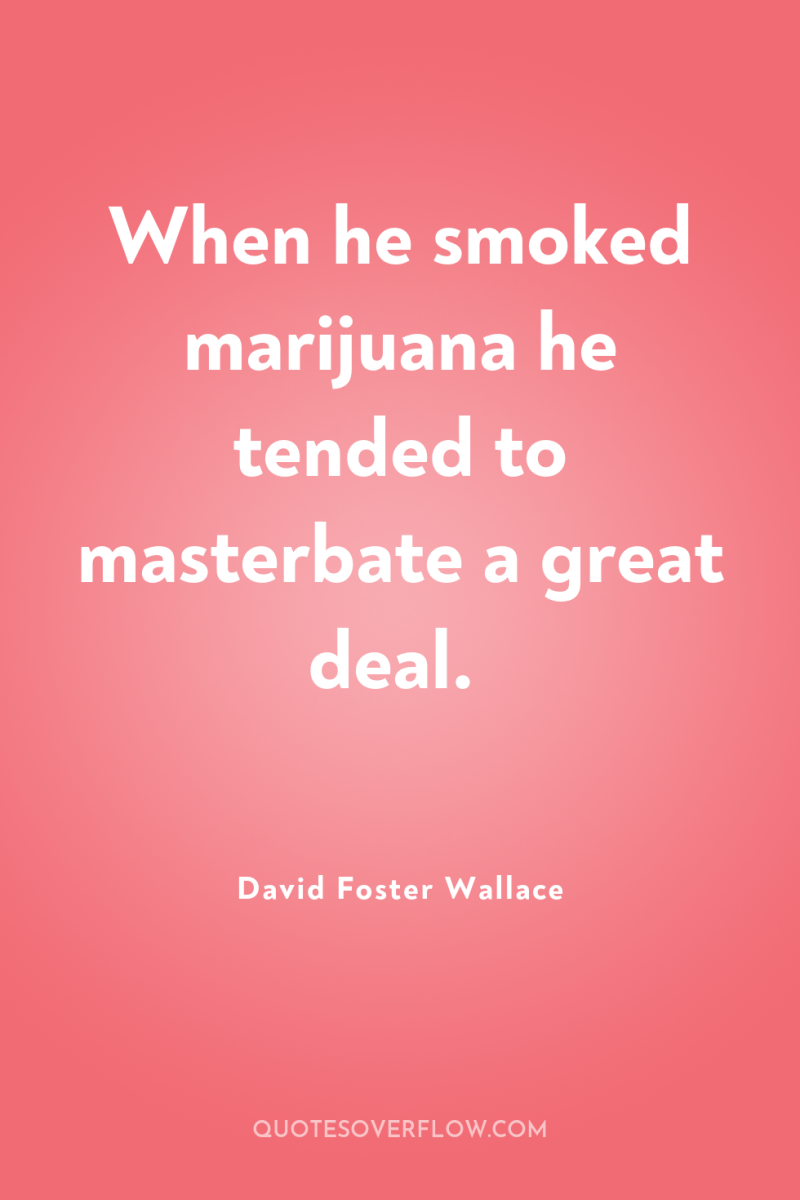
38
When he smoked marijuana he tended to masterbate a great deal.David Foster Wallace
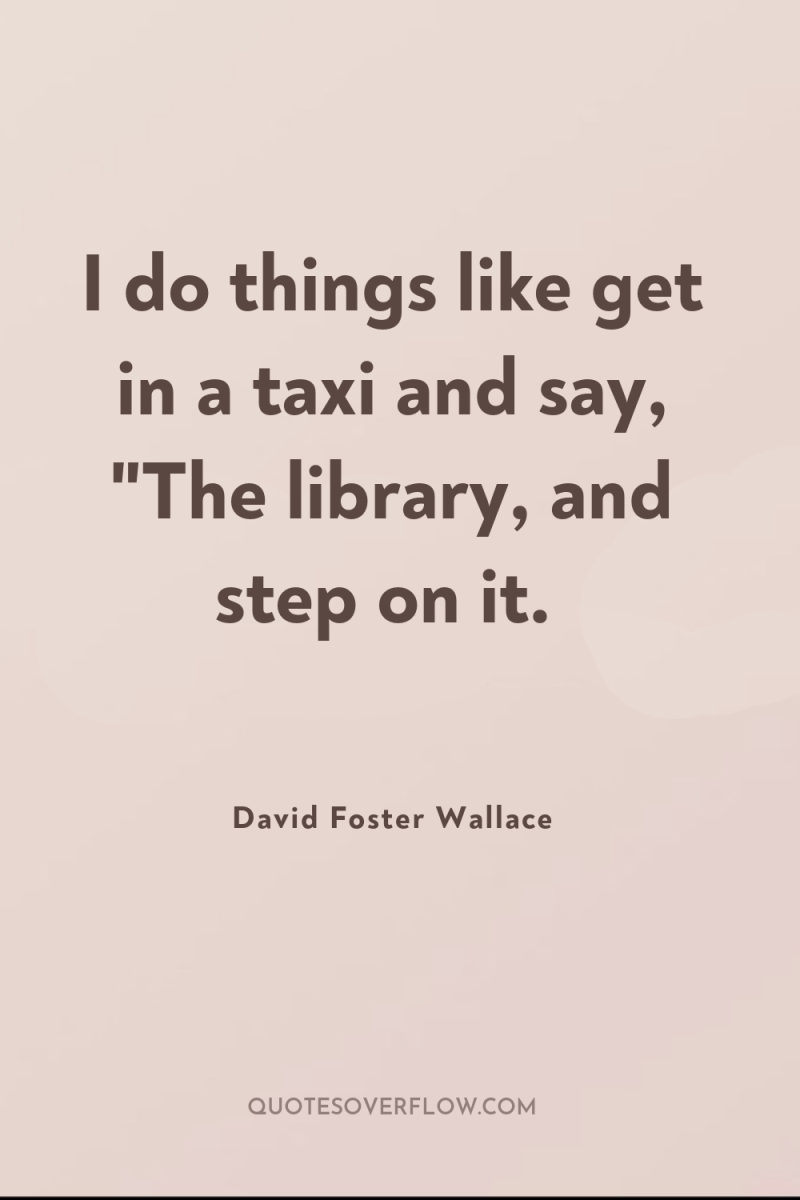
39
I do things like get in a taxi and say, "The library, and step on it.David Foster Wallace
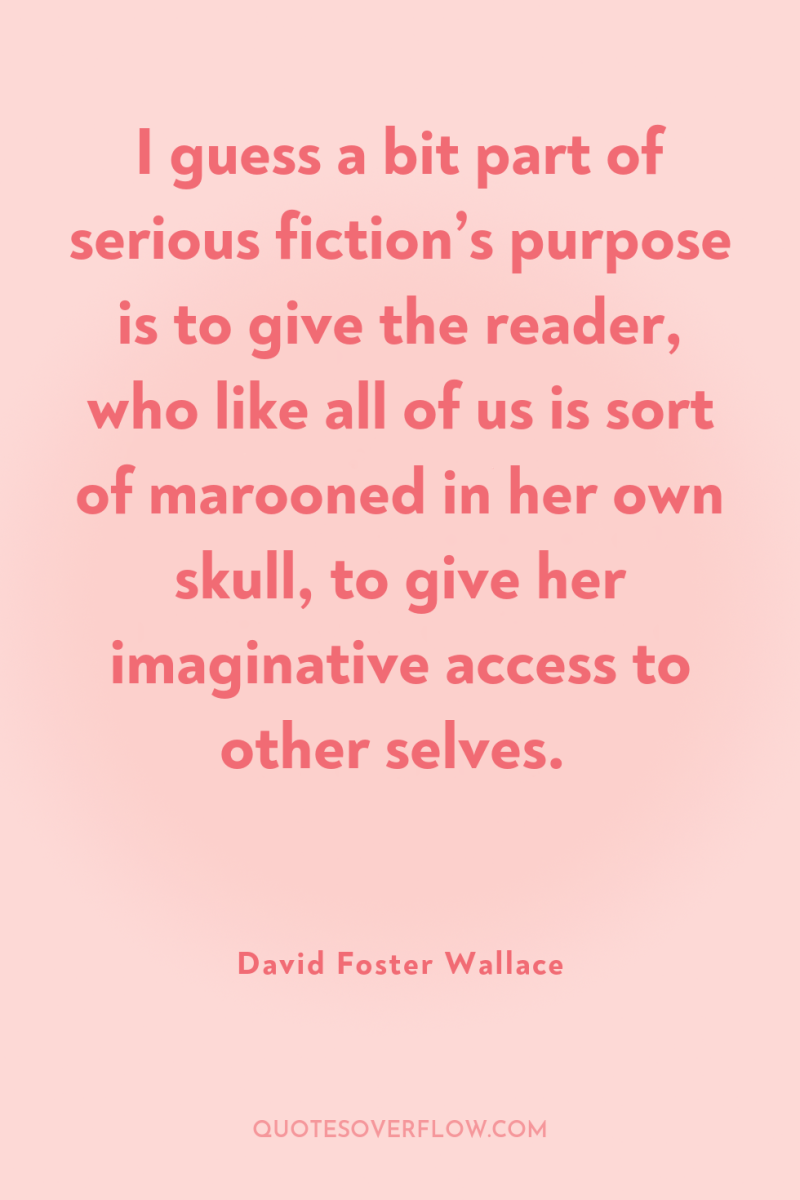
40
I guess a bit part of serious fiction’s purpose is to give the reader, who like all of us is sort of marooned in her own skull, to give her imaginative access to other selves.David Foster Wallace
41
When people call it [depression] I always get pissed off because I always think depression sounds like you just get like really sad, you get quiet and melancholy and just like sit quietly by the window sighing or just lying around. A state of not caring about anything. A kind of blue kind of peaceful state … Well this - isn’t a state. This is a feeling. I feel it all over. In my arms and legs … All over. My head, throat, butt. In my stomach. It’s all over everywhere. I don’t know what to call it. It’s like I can’t get enough outside it to call it anything. It’s like horror more than sadness. It’s more like horror. It’s like something horrible is about to happen, the most horrible thing you imagine — no, worse than you can imagine because there’s the feeling that there’s something you have to do right away to stop it but you don’t know what it is you have to do, and then it’s happening, too, the whole horrible time, it’s about to happen and also it’s happening, all at the same time. … Everything gets horrible. Everything you see gets ugly. Lurid is the word. … That’s the right word for it. And everything sounds harsh, spiny and harsh-sounding, like every sound you hear all of a sudden has teeth. And smelling like I smell bad even after I just got out of the shower. It’s like what’s the point of washing if everything smells like I need another shower.David Foster Wallace
42
Like most North Americans of his generation, Hal tends to know way less about why he feels certain ways about the objects and pursuits he's devoted to than he does about the objects and pursuits themselves. It's hard to say for sure whether this is even exceptionally bad, this tendency.David Foster Wallace
43
The patriotic or religious bumper stickers always seem to be on the biggest, most disgustingly selfish vehicles driven by the ugliest, most inconsiderate and aggressive drivers, who are usually talking on cell phones as they cut people off in order to get just twenty stupid feet ahead in the traffic jam...David Foster Wallace
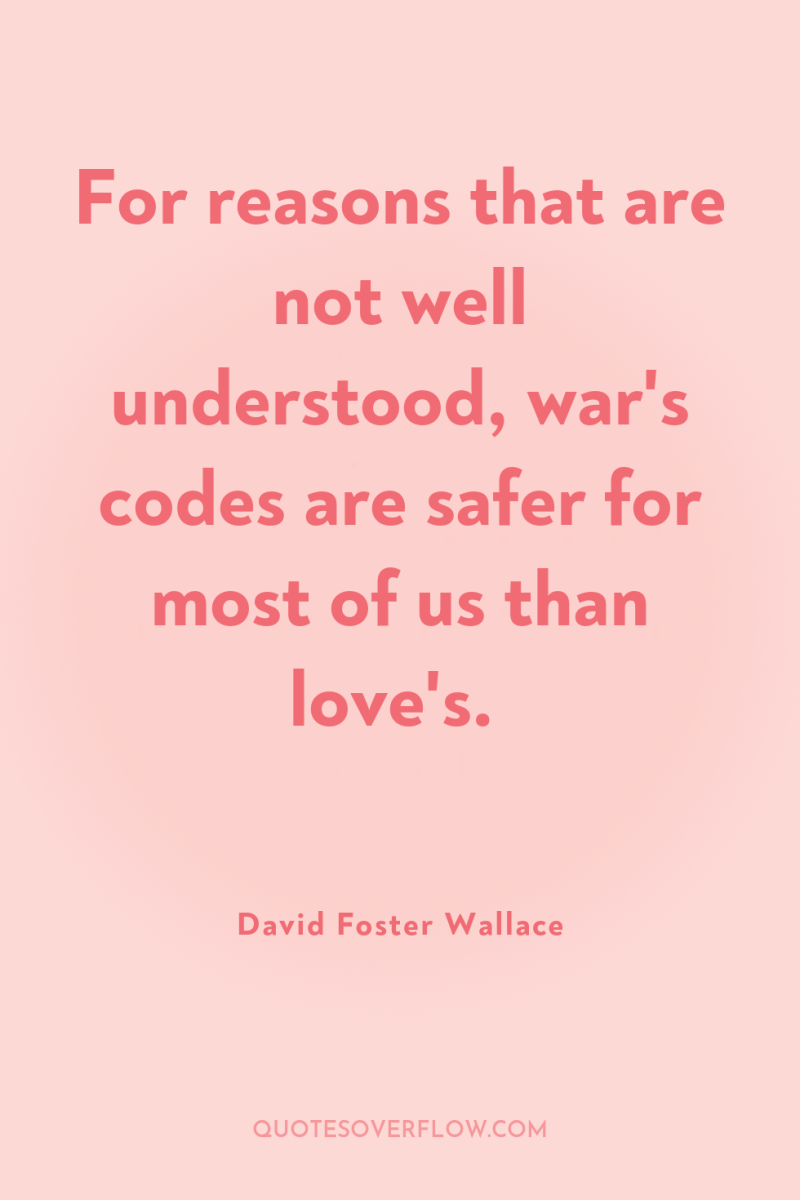
44
For reasons that are not well understood, war's codes are safer for most of us than love's.David Foster Wallace
45
Almost anyone who loves tennis and follows the men’s tour on television has, over the last few years, had what might be termed Federer Moments. These are times, watching the young Swiss at play, when the jaw drops and eyes protrude and sounds are made that bring spouses in from other rooms to see if you’re OK.David Foster Wallace
46
In short, not only was it surprising to be greeted in person with such enthusiastic words, but it was doubly surprising when the person reciting these words displayed the same kind of disengagement as, say, the checkout clerk who utters the words 'Have a nice day' while her expression indicates that it's really a matter of total indifference to her whether you drop dead in the parking lot outside ten seconds from now.David Foster Wallace
47
Because we’ve been lied to and lied to, and it hurts to be lied to. It’s ultimately just about that complicated: it hurts. It denies you respect for yourself, for the liar, for the world. Especially if the lies are chronic, systemic, if hard experience seems to teach that everything you’re supposed to believe in’s really a game based on lies. Young Voters have been taught well and thoroughly. You may not personally remember Vietnam or Watergate, but it’s a good bet you remember ‘No new taxes’ and ‘Out of the loop’ and ‘No direct knowledge of any impropriety at this time’ and Did not inhale’ and ‘Did not have sex with that woman’ and etc. etc. It’s depressing and painful to believe that the would-be ‘public servants’ you’re forced to choose between are all phonies whose only real concern is their own care and feeding and who will lie so outrageously with such a straight face that you just know they have to believe you’re an idiot. So who wouldn’t fall all over themselves for a top politician who actually seemed to talk to you like you were a person, an intelligent adult worthy of respect? .David Foster Wallace
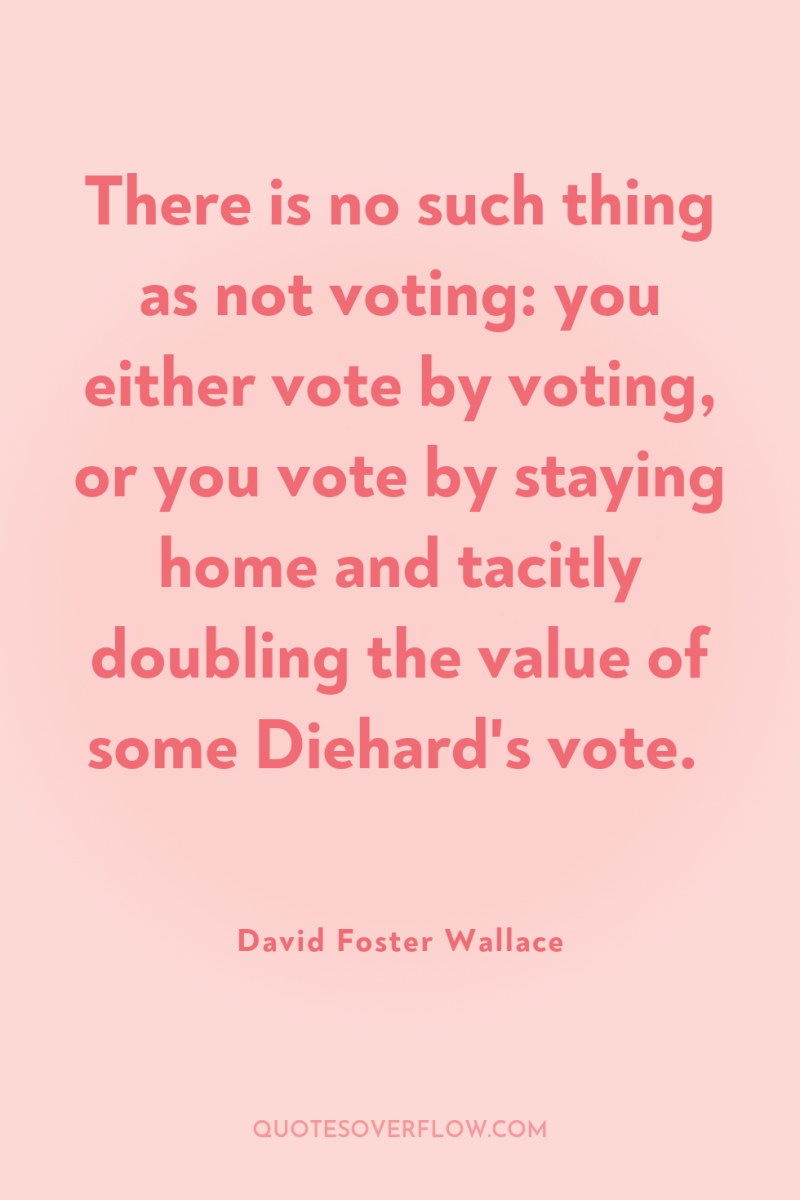
48
There is no such thing as not voting: you either vote by voting, or you vote by staying home and tacitly doubling the value of some Diehard's vote.David Foster Wallace
49
…95 percent of political commentary, whether spoken or written, is now polluted by the very politics it’s supposed to be about. Meaning it’s become totally ideological and reductive: The writer/speaker has certain political convictions or affiliations, and proceeds to filter all reality and spin all assertion according to those convictions and loyalties. Everybody’s pissed off and exasperated and impervious to argument from any other side. Opposing viewpoints are not just incorrect but contemptible, corrupt, evil […] Political discourse is now a formulaic matter of preaching to one’s own choir and demonizing the opposition. Everything’s relentlessly black-and-whitened…. Since the truth is way, way more gray and complicated than any one ideology can capture, the whole thing seems to me not just stupid but stupefying… How can any of this possibly help me, the average citizen, deliberate about whom to choose to decide my country’s macroeconomic policy, or how even to conceive for myself what that policy’s outlines should be, or how to minimize the chances of North Korea nuking the DMZ and pulling us into a ghastly foreign war, or how to balance domestic security concerns with civil liberties? Questions like these are all massively complicated, and much of the complication is not sexy, and well over 90 percent of political commentary now simply abets the uncomplicatedly sexy delusion that one side is Right and Just and the other Wrong and Dangerous. Which is of course a pleasant delusion, in a way–as is the belief that every last person you’re in conflict with is an asshole–but it’s childish, and totally unconducive to hard thought, give and take, compromise, or the ability of grown-ups to function as any kind of community. .David Foster Wallace
50
Real leaders are people who “help us overcome the limitations of our own individual laziness and selfishness and weakness and fear and get us to do better, harder things than we can get ourselves to do on our own.David Foster Wallace
51
I read, ' I say. 'I study and read. I bet I've read everything you've read. Don't think I haven't. I consume libraries. I wear out spines and ROM drives. I do things like get in a taxi and say, "The library, and step on it.David Foster Wallace
52
That’s why people use terms like flow or effortless to describe writing that they regard as really superb. They’re not saying effortless in terms of it didn’t seem like the writer spent any work. It simply requires no effort to read it – the same way listening to an incredible storyteller talk out loud requires no effort to pay attention. Whereas when you’re bored, you’re conscious of how much effort is required to pay attention. .David Foster Wallace
53
That as people age, accumulate more and more private experiences, their sense of history tightens, narrows, becomes more personal? So that to the extent that they remember events of social importance, they remember only for example 'where they were' when such-and-such occurred. Et cetera et cetera. Objective events and data become naturally more and more subjectively colored.David Foster Wallace
54
Really good fiction could have as dark a worldview as it wished, but it'd find a way both to depict this world and to illuminate the possibilities for being alive and human iDavid Foster Wallace
55
Let me put it this way: You cannot live in the world without being in pain, spiritual and physical pain. We have developed mechanisms to deal with these pains, to overcome them somehow. Therapy, religion and spirituality, relationships, material success. All this can work, but also become a problem itself. The pursuit of happiness has even been put into the American constitution a couple centuries ago. Today we're so rich, we own much more than we need, we have liberties unknown before, even though they are endangered in the current political climate in the US - and we forget how wonderful it nevertheless is, compared to most other political and economic systems. We have a saying that goes: Give a man enough rope and he hangs himself. .David Foster Wallace
56
You decide. You be the judge. It says You are welcome regardless of severity. Severity is in the eye of the sufferer, it says. Pain is pain.David Foster Wallace
57
Something they seem to omit to mention in Boston AA when you're new and out of your skull with desperation and ready to eliminate your map and they tell you how it'll all get better and better as you abstain and recover: they somehow omit to mention that the way it gets better and you get better is through pain. Not around pain, or in spite of it.David Foster Wallace
58
Nuclear weapons and TV have simply intensified the consequences of our tendencies.David Foster Wallace
59
And then also, again, still, what are those boundaries, if they’re not baselines, that contain and direct its infinite expansion inward, that make tennis like chess on the run, beautiful and infinitely dense? The true opponent, the enfolding boundary, is the player himself. Always and only the self out there, on court, to be met, fought, brought to the table to hammer out terms. The competing boy on the net’s other side: he is not the foe: he is more the partner in the dance. He is the what is the word excuse or occasion for meeting the self. As you are his occasion. Tennis’s beauty’s infinite roots are self-competitive. You compete with your own limits to transcend the self in imagination and execution. Disappear inside the game: break through limits: transcend: improve: win. Which is why tennis is an essentially tragic enterprise… You seek to vanquish and transcend the limited self whose limits make the game possible in the first place. It is tragic and sad and chaotic and lovely. All life is the same, as citizens of the human State: the animating limits are within, to be killed and mourned, over and over again… Mario thinks hard again. He’s trying to think of how to articulate something like: But then is battling and vanquishing the self the same as destroying yourself? Is that like saying life is pro-death? … And then but so what’s the difference between tennis and suicide, life and death, the game and its own end? .David Foster Wallace
60
Trite though it (used to) sound, real sexuality is about our struggles to connect with one another, to erect bridges across the chasms that separate selves. Sexuality is, finally, about imagination. Thanks to brave people's recognition of AIDS as a fact of life, we are beginning to realize that highly charged sex can take place in all sorts of ways we'd forgotten or neglected–in a conversational nuance; in a body's posture, a certain pressure in a held hand. Sex can be everywhere we are, all the time. .David Foster Wallace
61
Okay, you know, is it weird to get so depressed watching a children’s Christmas special– Oh, wait, I shouldn’t say that. I mean, that’s not a good word. It’s not just “sadness, ” the way one feels sad at a film or a funeral. It’s more of a plummeting quality. Or the way, you know, the way that light gets in winter just before dusk, or the way she is with me. All right, at the height of lovemaking, you know, the very height, when she’s starting to climax, and she’s really responding to you now, you know, her eyes widening in that way that’s both, you know, surprise and recognition, which not a woman alive could fake or feign if you really look intently at her, really see her. And I don’t know, this moment has this piercing sadness to it, of the loss of her in her eyes. And as her eyes, you know, widen to their widest point and as she begins to climax and arch her back, they close. You know, shut, the eyes do. And I can tell that she’s closed her eyes to shut me out. You know, I become like an intruder. And behind those closed lids, you know, her eyes are now rolled all the way around and staring intently inward into some void where l, who sent them, can’t follow.David Foster Wallace
62
You see parents as kind or unkind or happy or miserable or drunk or sober or great or near-great or failed the way you see a table square or a Montclair lip-read. Kids today.. you kids today somehow don't know how to feel, much less love, to say nothing of respect. We're just bodies to you. We're just bodies and shoulders and scarred knees and big bellies and empty wallets and flasks to you. I'm not saying something cliché like you take us for granted so much as I'm saying you cannot.. imagine our absence. We're so present it's ceased to mean. We're environmental. Furniture of the world. .David Foster Wallace
63
A manual for how to build a mentally ill childDavid Foster Wallace
64
Fiction is one of the few experiences where loneliness can be both confronted and relieved. Drugs, movies where stuff blows up, loud parties -- all these chase away loneliness by making me forget my name's Dave and I live in a one-by-one box of bone no other party can penetrate or know. Fiction, poetry, music, really deep serious sex, and, in various ways, religion -- these are the places (for me) where loneliness is countenanced, stared down, transfigured, treated.David Foster Wallace
65
Good fiction’s job is to comfort the disturbed and disturb the comfortable.David Foster Wallace
66
How can even the idea of rebellion against corporate culture stay meaningful when Chrysler Inc. advertises trucks by invoking “The Dodge Rebellion”? How is one to be bona fide iconoclast when Burger King sells onion rings with “Sometimes You Gotta Break the Rules”? How can an Image-Fiction writer hope to make people more critical of televisual culture by parodying television as a self-serving commercial enterprise when Pepsi and Subaru and FedEx parodies of self-serving commercials are already doing big business? It’s almost a history lesson: I’m starting to see just why turn-of-the-century Americans’ biggest fear was of anarchist and anarchy. For if anarchy actually wins, if rulelessness become the rule, then protest and change become not just impossible but incoherent. It’d be like casting a ballot for Stalin: you are voting for an end to all voting. .David Foster Wallace
67
Leyner's fiction is, in this regard, an eloquent reply to Gilder's prediction that our TV-culture problems can be resolved by the dismantling of images into discrete chunks we can recombine as we fancy. Leyner's world is a Gilder-esque dystopia. The passivity and schizoid decay still endure for Leyner in his characters' reception of images and waves of data. The ability to combine them only adds a layer of disorientation: when all experience can be deconstructed and reconfigured, there become simply too many choices. And in the absence of any credible, noncommercial guides for living, the freedom to choose is about as "liberating" as a bad acid trip: each quantum is as good as the next, and the only standard of an assembly's quality is its weirdness, incongruity, its ability to stand out from a crowd of other image-constructs and wow some Audience.David Foster Wallace
68
Look man, we'd probably most of us agree that these are dark times, and stupid ones, but do we need fiction that does nothing but dramatize how dark and stupid everything is? In dark times, the definition of good art would seem to be art that locates and applies CPR to those elements of what's human and magical that still live and glow despite the times' darkness. Really good fiction could have as dark a worldview as it wished, but it'd find a way both to depict this world and to illuminate the possibilities for being alive and human in it.David Foster Wallace
69
Huh. Well you and I just disagree. Maybe the world just feels differently to us. This is all going back to something that isn't really clear: that avant-garde stuff is hard to read. I'm not defending it, I'm saying that stuff - this is gonna get very abstract - but there's a certain set of magical stuff that fiction can do for us. There's maybe thirteen things, of which who even knows which ones we can talk about. But one of them has to do with the sense of, the sense of capturing, capturing what the world feels like to us, in the sort of way that I think that a reader can tell "Another sensibility like mine exists." Something else feels this way to someone else. So that the reader feels less lonely.David Foster Wallace
70
If an art form is marginalized it's because it's not speaking to people.David Foster Wallace
71
Under fun’s new administration, writing fiction becomes a way to go deep inside yourself and illuminate precisely the stuff you don’t want to see or let anyone else see, and this stuff usually turns out (paradoxically) to be precisely the stuff all writers and readers share and respond to, feel. Fiction becomes a weird way to countenance yourself and to tell the truth instead of being a way to escape yourself or to present yourself in a way you figure you will be maximally likable. This process is complicated and confusing and scary, and also hard work, but it turns out to be the best fun there is. The fact that you can now sustain the fun of writing only by confronting the very same unfun parts of yourself you’d first used writing to avoid or disguise is another paradox, but this one isn’t any kind of bind at all. What it is is a gift, a kind of miracle, and compared to it the reward of strangers’ affection is as dust, lint.David Foster Wallace
72
Workshop Hermeticism, fiction for which the highest praise involves the words 'competent, ' 'finished, ' 'problem-free, ' fiction over which Writing-Program pre- and proscriptions loom with the enclosing force of horizons: no character without Freudian trauma in accessible past, without near-diagnostic physical description; no image undissolved into regulation Updikean metaphor; no overture without a dramatized scene to 'show' what's 'told'; no denouement prior to an epiphany whose approach can be charted by and Freitag on any Macintosh.David Foster Wallace
73
Of course, the fact that Dostoevsky can tell a juicy story isn’t enough to make him great. If it were, Judith Krantz and John Grisham would be great fiction writers, and by any but the most commercial standards they’re not even very good.David Foster Wallace
74
With still, underneath, the old respectable-girl-versus-slut thing. It’s OK to fuck around if you’re a feminist but it’s also not OK to fuck around because most guys aren’t feminists and won’t respect you and won’t call you again if you fuck around.David Foster Wallace
75
What if the preacher or father’s saying ‘Someone here’s lost and hopeless’ was tantamount to those Sun-Times horoscopes that are specially designed to be so universally obvious that they always give their horoscope readers that special eerie feeling of particularity and insight, exploiting the psychological fact that most people are narcissistic and prone to the illusion that they and their problems are uniquely special and that if they’re feeling a certain way then surely they’re the only person who is feeling like that.David Foster Wallace
76
You know, the whole thing about perfectionism. The perfectionism is very dangerous. Because of course if your fidelity to perfectionism is too high, you never do anything. Because doing anything results in...it's actually kind of tragic because you sacrifice how gorgeous and perfect it is in your head for what it really is. And there were a couple of years where I really struggled with that.David Foster Wallace
77
To make someone an icon is to make him an abstraction, and abstractions are incapable of vital communication with living people.1010 One has only to spend a term trying to teach college literature to realize that the quickest way to kill an author's vitality for potential readers is to present that author ahead of his time as "great" or "classic." Because then the author becomes for the students like medicine or vegetables, something the authorities have declared "good for them" that they "ought to like, " at which point the students' nictitating membranes come down, and everyone just goes through the requisite motions of criticism and paper-writing without feeling one real or relevant thing. It's like removing all oxygen from the room before trying to start a fire.David Foster Wallace
78
Anybody gets to ask questions about any fiction-related issues she wants. No question about literature is stupid. You are forbidden to keep yourself from asking a question or making a comment because you fear it will sound obvious or unsophisticated or lame or stupid. Because critical reading and prose fiction are such hard, weird things to try to study, a stupid-seeming comment or question can end up being valuable or even profound. I am deadly-serious about creating a classroom environment where everyone feels free to ask or speak about anything she wishes. So any student who groans, smirks, mimes machines-gunning or onanism, chortles, eye-rolls, or in any way ridicules some other student's in-class question/comment will be warned once in private and on the second offense will be kicked out of class and flunked, no matter what week it is. If the offender is male, I am also apt to find him off-campus and beat him up.. . This does not mean we all have to sit around smiling sweetly at one another for three hours a week. No truths about the form, content, structure, symbolism, theme, or overall artistic quality of any piece of fiction are etched in stone or beyond dispute. .David Foster Wallace
79
Anybody gets to ask questions about any fiction-related issues she wants. No question about literature is stupid. You are forbidden to keep yourself from asking a question or making a comment because you fear it will sound obvious or unsophisticated or lame or stupid. Because critical reading and prose fiction are such hard, weird things to try to study, a stupid-seeming comment or question can end up being valuable or even profound. I am deadly-serious about creating a classroom environment where everyone feels free to ask or speak about anything she wishes. So any student who groans, smirks, mimes machines-gunning or onanism, chortles, eye-rolls, or in any way ridicules some other student's in-class question/comment will be warned once in private and on the second offense will be kicked out of class and flunked, no matter what week it is. If the offender is male, I am also apt to find him off-campus and beat him up. .David Foster Wallace
80
It's not what you lift, it's where you carry it.David Foster Wallace
81
There is something magical to me about literature and fiction and I think it can do things not only that pop culture cannot do but that are urgent now: one is that by creating a character in a work of fiction you can allow a reader to leap over the wall of self and to allow him to imagine himself not only somewhere else but someone else in a way that television and movies, in a way that no other form can do. I think people are essentially lonely and alone and frightened of being alone.David Foster Wallace
82
Postmodern irony and cynicism's become an end in itself, a measure of hip sophistication and literary savvy. Few artists dare to try to talk about ways of working toward redeeming what's wrong, because they'll look sentimental and naive to all the weary ironists. Irony's gone from liberating to enslaving.. The postmodern founders' patricidal work was great, but patricide produces orphans, and no amount of revelry can make up for the fact that writers my age have been literary orphans throughout our formative years. .David Foster Wallace
83
How odd I can have all this inside me and to you it’s just words.David Foster Wallace
84
Some words have to be explicitly uttered, Lenore. Only by actually uttering certain words does one really DO what one SAYS. ‘Love’ is one of those words, performative words. Some words can literally make things real.David Foster Wallace
85
The so-called ‘psychotically depressed’ person who tries to kill herself doesn’t do so out of quote ‘hopelessness’ or any abstract conviction that life’s assets and debits do not square. And surely not because death seems suddenly appealing. The person in whom Its invisible agony reaches a certain unendurable level will kill herself the same way a trapped person will eventually jump from the window of a burning high-rise. Make no mistake about people who leap from burning windows. Their terror of falling from a great height is still just as great as it would be for you or me standing speculatively at the same window just checking out the view; i.e. the fear of falling remains a constant. The variable here is the other terror, the fire’s flames: when the flames get close enough, falling to death becomes the slightly less terrible of two terrors. It’s not desiring the fall; it’s terror of the flames. And yet nobody down on the sidewalk, looking up and yelling ‘Don’t! ’ and ‘Hang on! ’, can understand the jump. Not really. You’d have to have personally been trapped and felt flames to really understand a terror way beyond falling.David Foster Wallace
86
This story ["The Depressed Person"] was the most painful thing I ever wrote. It's about narcissism, which is a part of depression. The character has traits of myself. I really lost friends while writing on that story, I became ugly and unhappy and just yelled at people. The cruel thing with depression is that it's such a self-centered illness - Dostoevsky shows that pretty good in his "Notes from Underground". The depression is painful, you're sapped/consumed by yourself; the worse the depression, the more you just think about yourself and the stranger and repellent you appear to others.David Foster Wallace
87
Kate Gompert’s always thought of this anhedonic state as a kind of radical abstracting of everything, a hollowing out of stuff that used to have affective content. Terms the undepressed toss around and take for granted as full and fleshy–happiness, joie de vivre, preference, love–are stripped to their skeletons and reduced to abstract ideas. They have, as it were, denotation but not connotation. The anhedonic can still speak about happiness and meaning et al., but she has become incapable of feeling anything in them, of understanding anything about them, of hoping anything about them, or of believing them to exist as anything more than concepts. Everything becomes an outline of the thing. Objects become schemata. The world becomes a map of the world. An anhedonic can navigate, but has no location. I.e. the anhedonic becomes, in the lingo of Boston AA, Unable To Identify. .David Foster Wallace
88
It is also lonely on a level that cannot be conveyed ... If a person in physical pain has a hard time attending to anything except that pain, a clinically depressed person cannot even perceive any other person or thing as independent of the universal pain that is digesting her cell by cell.David Foster Wallace
89
I am not sure whether you could call this abuse, but when I was (long ago) abroad in the world of dry men, I saw parents, usually upscale and educated and talented and functional and white, patient and loving and supportive and concerned and involved in their children’s lives, profilgate with compliments and diplomatic with constructive criticism, loquacious in their pronouncements of unconditional love for and approval of their children, conforming to every last jot-tittle in any conceivably definition of a good parent, I saw parent after unimpeachable parent who raised kids who were (a) emotionally retarded or (b) lethally self-indulgent or (c) chronically depressed or (d) borderline psychotic or (e) consumed with narcissistic self-loathing or (f) neurotically driven/addicted or (g) variously psychosomatically Disabled or (h) some conjunctive permutation of (a) … (g).Why is this. Why do many parents who seem relentlessly bent on producing children who feel they are good persons deserving of love produce children who grow to feel they are hideous persons not deserving of love who just happen to have lucked into having parents so marvelous that the parents love them even though they are hideous? Is it a sign of abuse if a mother produces a child who believes not that he is innately beautiful and lovable and deserving of magnificent maternal treatment but somehow that he is a hideous unlovable child who has somehow lucked in to having a really magnificent mother? Probably not. But could such a mother then really be all that magnificent, if that’s the child’s view of himself?.. I think, Mrs. Starkly, that I am speaking of Mrs. Avril M.-T. Incandenza, although the woman is so multileveled and indictment-proof that it is difficult to feel comfortable with any sort of univocal accusation of anything. Something just was not right, is the only way to put it. Something creepy, even on the culturally stellar surface.David Foster Wallace
90
Its emotional character … is probably mostly indescribable except as a sort of double bind in which any/all of the alternatives we associate with human agency –sitting or standing, doing or resting, speaking or keeping silent, living or dying– are not just unpleasant but literally horrible.David Foster Wallace
91
The so-called 'psychotically depressed' person who tries to kill herself doesn't do so out of quote 'hopelessness' or any abstract conviction that life's assets and debits do not square. And surely not because death seems suddenly appealing. The person in whom Its invisible agony reaches a certain unendurable level will kill herself the same way a trapped person will eventually jump from the window of a burning high-rise. Make no mistake about people who leap from burning windows. Their terror of falling from a great height is still just as great as it would be for you or me standing speculatively at the same window just checking out the view; i.e. the fear of falling remains a constant. The variable here is the other terror, the fire's flames: when the flames get close enough, falling to death becomes the slightly less terrible of two terrors. It's not desiring the fall; it's terror of the flames. And yet nobody down on the sidewalk, looking up and yelling 'Don't! ' and 'Hang on! ', can understand the jump. Not really. You'd have to have personally been trapped and felt flames to really understand a terror way beyond falling.David Foster Wallace
92
The depressed person was in terrible andunceasing emotional pain, and the impossibility of sharing or articulating this pain was itself a component of the pain and a contributing factor in its essential horror. Despairing, then, of describing the emotional pain itself, the depressed person hoped at least to be able to express something of its context, its shape and texture, as it were-by recounting circumstances related to its etiology.David Foster Wallace
93
When people call it that I always get pissed off because I always think depression sounds like you just get like really sad, you get quiet and melancholy and just like sit quietly by the window sighing or just lying around. A state of not caring about anything. A kind of blue kind of peaceful state.David Foster Wallace
94
But if you really learn how to pay attention, then you will know there are other options. It will actually be within your power to experience a crowded, hot, slow, consumer-hell type situation as not only meaningful, but sacred, on fire with the same force that made the stars: love, fellowship, the mystical oneness of all things deep down.David Foster Wallace
95
And I was -- this is just how I was afraid you'd take it. I knew it, that you'd think this means you were right to be afraid all the time and never feel secure or trust me. I knew it'd be 'See, you're leaving after all when you promised you wouldn't.' I knew it but I'm trying to explain anyway, okay? And I know you probably won't understand this either, but --wait-- just try to listen and maybe absorb this, okay? Ready? Me leaving is not the confirmation of all your fears about me. It is not. It's because of them. Okay? Can you see that? It's your fear I can't take. It's your distrust and fear I've been trying to fight. And I can't anymore. I'm out of gas on it. If I loved you even a little less maybe I could take it. But this is killing me, this constant feeling that I am always scaring you and never making you feel secure. Can you see that? .David Foster Wallace
96
I don't think irony's meant to synergize with anything as heartfelt assadness.David Foster Wallace
97
For me, boviscopophobia (=the morbid fear of being seen as bovine) is an even stronger motive than semi-agoraphobia for staying on the ship when we're in port.David Foster Wallace
98
...having a lot of money does not immunize people from suffering or fear.David Foster Wallace
99
It's weird to feel like you miss someone you're not even sure you know.David Foster Wallace
100
An ad that pretends to be art is -- at absolute best -- like somebody who smiles warmly at you only because he wants something from you. This is dishonest, but what's sinister is the cumulative effect that such dishonesty has on us: since it offers a perfect facsimile or simulacrum of goodwill without goodwill's real spirit, it messes with our heads and eventually starts upping our defenses even in cases of genuine smiles and real art and true goodwill. It makes us feel confused and lonely and impotent and angry and scared. It causes despair. .David Foster Wallace